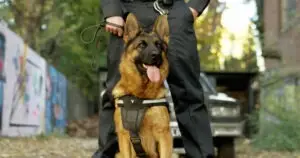
In South Carolina, the liability in a dog attack is overseen by a legal code known as strict liability. This means the dog owner or the dog’s caretaker is liable for any damages a victim suffers if the dog attacks or bites as long as the victim is in a public place, lawfully on private property, or even on the dog owner or caretaker’s property when they are attacked.
But what if the dog that bites you is a police K9? Is the K9 officer or the police department liable for damages? The experienced South Carolina dog bite lawyers at Shelly Leeke Law Firm can determine where the liability lies. We will gather evidence for the case, skillfully negotiate, and fight for the compensation needed to fully recover from your injuries.
The Job of a Police Dog
A human’s nose has about five million scent receptors. Dogs have more than 200 million scent receptors. Because of their keen sense of smell, K-9 police dogs are often used for multiple forms of detection in various situations, although many are trained specifically to look for drugs or people.
In all conditions, K-9 units are utilized to locate people or evidence or to thoroughly search people, property, or vehicles. Some specific examples of the jobs of police dogs include:
- Detection: K-9 units are often used to detect several substances like drugs, explosives, flammable accelerants, and crime scene evidence.
- Traffic stops: K-9 units are often used to circle vehicles and detect drugs or other substances. If a dog smells illegal substances it is enough for probable cause, but it is not a violation of the Fourth Amendment (illegal search and seizure).
- Search and rescue: K-9 units are invaluable tools for search and rescue efforts, finding missing persons who were kidnapped or lost, or the deceased who were hidden or buried.
- Tracking: K-9 units often track suspects fleeing a crime scene or escaping incarceration.
- Pursuits and apprehension: Highly trained K-9 units may be utilized to chase down and restrain a suspect by biting them during an apprehension.

SC Dog Bite Laws and K-9 Police Dogs
Regardless of how helpful K-9 units are, they are still dogs, and dogs can also be dangerous. There are cases when a dog’s handlers or a police department are liable for dog bite injuries and the damages resulting from the attack.
The key to holding government agents accountable for wrongful actions that result in injuries can be found under the combined legal canvas of:
- The South Carolina Tort Claims Act
- Federal statutes
- Case law
Under these laws, the immunity of police dogs acting in the capacity of enforcing the law is limited, and the officer handling the dog and the government agency the handler is working for have to comply with the requirements of state laws. If they do not comply, their immunity and protections will be lost. These laws also make it possible to claim a government agent is liable if the agents deprive the Constitutional and lawful rights, privileges, and immunities of US citizens.
Holding Police Dogs Accountable for Bites
Under the laws governing strict liability, there are some exceptions where liability for an attacking dog is not applicable. One of these liability exceptions concerns dogs being used by a government agency while performing their duties to enforce the law.
In analyzing this legal clause, several instances can be examined to show pathways to liability. This requires breaking down what function and capacity the police dog is performing and when they are performing it.
There are plenty of exceptions to a K-9 police dog’s immunity, and the canine officer or the government agency may be liable for damages. A few examples of this are:
- When a police officer’s dog is not necessarily working for a government agency, such as if the officer brings their dog to work, and the dog bites someone while there
- If a trained K-9 unit attacks someone when an officer is off-duty and not acting in the capacity of enforcing laws
- If an officer and their K-9 unit are on duty but not performing official duties when someone is attacked
- If a police dog bites, knocks down, or otherwise injures someone and it was not a direct result of a certified K-9 unit officer’s lawful command
- If the dog attacks because of a dog handler’s command, but the handler is not a properly certified K-9 unit officer
- If the dog never received or did not finish certified training corresponding with the standards of the South Carolina Law Enforcement Training Council
- If the government agency lacks a written policy specifying the need and correct utilization of dogs to perform official law enforcement duties
- If the police dog or the K-9 officer violates the written policy the agency has in place validating the police dog’s employment
- If the actions of the dog or its handler constitute excessive force
- If a certified and trained police dog is performing a lawful command to enforce the law and attacks an innocent bystander in the process

Contacting a South Carolina Dog Bite Attorney
Typically, K-9 police dogs adhere to their training, and their handlers control them with precision according to the intensive standards of South Carolina canine training protocols. However, mistakes happen, and police dogs have attacked innocent citizens in the past.
Dog bites can result in dire consequences for victims, which can be extremely painful and emotionally traumatic. These consequences only get more complicated when the dog is a K-9 unit. In order to navigate the legal process, it is important to retain the services of a South Carolina dog bite attorney.
At Shelly Leeke Law Firm, we know every dog bite case is different. We have the experience and skill to see your case through, from gathering evidence to obtaining the compensation you deserve. Contact us for a free consultation today.







